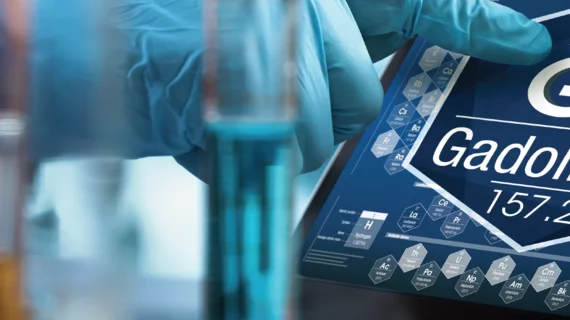Neuroradiologists have shown it is now possible to assess cancer patients’ response to treatment without administering gadolinium-based contrast agents, according to new data. Some experts believe it may help radiologists reduce their reliance on GBCAs.
With the help of deep learning, German researchers generated synthetic post-contrast T1-weighted MRI sequences using pre-contrast sequences, they reported Thursday in The Lancet Digital Health.
GBCA-free scans showed no significant difference when used to assess glioblastoma patients’ response to treatment compared to images enhanced with contrast. With further testing, the group sees their approach as a blueprint for radiologists to reduce the specialty’s use of contrast materials.
“These results suggest that although contrast-enhancing tumor volumes are underestimated when using synthetic post-contrast T1-weighted sequences, quantification of the relative change in the longitudinal tumor burden resembles the information that would otherwise only be available with administration of GBCA and acquisition of true post-contrast T1-weighted sequences,” Chandrakanth Jayachandran Preetha, MsC, with Heidelberg University Hospital’s Department of Neuroradiology, and co-authors added.
For their retrospective study, the team trained and validated their network on more than 5,000 MRI scans with further independent testing completed using another 1,900 exams.
Preetha et al. found mean time to progression was similar using GBCA-based and synthetic images, but the latter did classify 15% of patients with tumor progression who weren't classified as such based on contrast-enhanced scans.
In an accompanying editorial, two Dutch radiology experts pointed out the technique was validated on trial data from patients treated across 200 institutions, suggesting it can generalize across MRI machines.
“Such a performance suggests that synthetic samples could act as a meaningful substitute for GBCA-based images in determining treatment effects (in a trial setting), even if not being perfect copies that are readily recognized by human observers,” Alexandros Ferles, PhD, and Frederik Barkhof, MD, PhD, both with Amsterdam University Medical Center’s Department of Radiology and Nuclear Medicine, added. “Whether they perform equally well in a diagnostic setting was not examined.”
Related MRI Contrast Agent Safety Content:
A deep dive into gadolinium-based adverse reactions
Allergic reactions to iodinated CT contrast increase likelihood of sensitivity to GBCAs
Researchers detail data on gadolinium-related adverse reactions
Radiologists must take a data-driven approach to discuss gadolinium, mitigate liability risk
Radiologists see potential to reduce GBCA administration with new synthetic MRI technique
Gadolinium-based contrast agents are safe, even at higher doses, new research suggests
Gadolinium debate rages on, with radiologist questioning recent GBCA liability guidance
ACR committee proposes new term for symptoms associated with gadolinium exposure
Closing the knowledge gap on gadolinium retention risks
Radiologists find direct evidence linking gadolinium-based contrast agent to higher retention rates
AI software that eliminates need for gadolinium contrast during imaging exams wins patent
Research may offer new method to detect GBCA on MRI
Radiology, other multispecialty groups urge caution with GBCAs during interventional pain procedures
Cardiac MRI contrast agents are low-risk and safe for ‘overwhelming’ majority of patients
Health orgs publish special report about gadolinium retention, GBCA use in imaging
Rodent brains retain gadolinium after repeated administration of GBCA a year after injection
Advanced MRI mapping spots traces of gadolinium in the brain invisible during conventional scanning
Radiologists should keep patients’ best interests in mind to mitigate gadolinium liability risk

